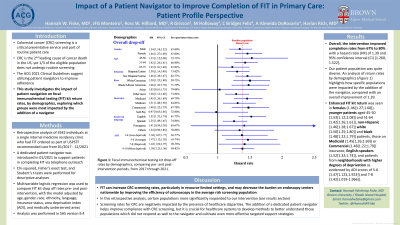Tuesday Poster Session
Category: Colorectal Cancer Prevention
P3209 - Impact of Patient Navigator to Improve Completion of Fecal Immunochemical Testing in Primary Care: Patient’s Profile Perspective
Tuesday, October 24, 2023
10:30 AM - 4:00 PM PT
Location: Exhibit Hall

Has Audio

Hannah W. Fiske, MD
Brown University/Rhode Island Hospital
Providence, RI
Presenting Author(s)
Hannah W. Fiske, MD1, J Filipe Monteiro, PhD2, Ross Hilliard, MD3, Ricky D. Grisson, MD, MBA, MPH4, Marlaydis Holloway, BS5, Carrie Bridges Feliz, MPH6, Ana Almeida DoRosario, BA6, Harlan Rich, MD3
1Brown University/Rhode Island Hospital, Providence, RI; 2Brown Medicine/Lifespan, Providence, RI; 3Warren Alpert Medical School of Brown University, Providence, RI; 4Lifespan Academic Medical Centers, Providence, RI; 5Lifespan, Providence, RI; 6Lifespan Community Health Institute, Providence, RI
Introduction: Colorectal cancer (CRC) screening is a critical preventative health service, yet a third of the eligible US population fails to undergo routine screening. The ACG 2021 Clinical Guidelines suggest utilizing patient navigators to improve adherence. This study investigates the impact of patient navigation on fecal immunochemical testing (FIT) kit return rates, by demographics, exploring which groups were most impacted by the addition of a navigator.
Methods: We conducted a retrospective analysis investigating the impact of a patient navigator on successful return of FIT kits for 3542 unique patients. FIT kits were ordered and analyzed from 01/2017 – 12/2021; in 01/2021 we introduced a dedicated patient navigator to support patients in completing FIT. Chi-square, Fisher exact, and Student’s t-tests were performed for descriptive analyses. Multivariable Cox Hazard regression model was used to compare FIT kit drop off rates pre- and post-intervention; analysis was performed in SAS version 9.4. When applicable, models were adjusted by gender, age, ethnicity, race, language, area deprivation index (ADI), and medically underserved areas.
Results: Overall, the intervention improved completion rates from 67% to 80% with a hazard ratio (HR) of 1.39 and 95% confidence interval (CI) [1.260; 1.522]. Our patient population was quite diverse (Table 1). An analysis of return rates by demographics (Figure 1) highlights how specific populations were impacted by the addition of the navigator, compared with an overall improvement of 1.39. Enhanced FIT kit return was seen in females (1.46[1.27;1.68]), younger patients aged 45-50 (1.53[1.12;2.08]) and 51-64 (1.42[1.26;1.61]), non-Hispanic (1.46[1.28;1.67]) white (1.50[1.25;1.80]) and black (1.48[1.22;1.79]) patients, those on Medicaid (1.45[1.26;1.69]) or Commercial (1.48[1.22;1.79]) insurance, English-speakers (1.52[1.32;1.74]), and patients from neighborhoods with ADI scores of 5-6 (1.47[1.123,1.923]) and 7-8 (1.42[1.019-1.966]).
Discussion: In this retrospective analysis, certain populations more significantly responded to our intervention. Screening rates for CRC are negatively impacted by the presence of healthcare disparities. The addition of a dedicated patient navigator helps improve compliance with CRC screening, but it is crucial for healthcare systems to develop methods to better understand those populations which did not respond as well to the navigator and cultivate even more effective targeted support strategies.

Disclosures:
Hannah W. Fiske, MD1, J Filipe Monteiro, PhD2, Ross Hilliard, MD3, Ricky D. Grisson, MD, MBA, MPH4, Marlaydis Holloway, BS5, Carrie Bridges Feliz, MPH6, Ana Almeida DoRosario, BA6, Harlan Rich, MD3. P3209 - Impact of Patient Navigator to Improve Completion of Fecal Immunochemical Testing in Primary Care: Patient’s Profile Perspective, ACG 2023 Annual Scientific Meeting Abstracts. Vancouver, BC, Canada: American College of Gastroenterology.
1Brown University/Rhode Island Hospital, Providence, RI; 2Brown Medicine/Lifespan, Providence, RI; 3Warren Alpert Medical School of Brown University, Providence, RI; 4Lifespan Academic Medical Centers, Providence, RI; 5Lifespan, Providence, RI; 6Lifespan Community Health Institute, Providence, RI
Introduction: Colorectal cancer (CRC) screening is a critical preventative health service, yet a third of the eligible US population fails to undergo routine screening. The ACG 2021 Clinical Guidelines suggest utilizing patient navigators to improve adherence. This study investigates the impact of patient navigation on fecal immunochemical testing (FIT) kit return rates, by demographics, exploring which groups were most impacted by the addition of a navigator.
Methods: We conducted a retrospective analysis investigating the impact of a patient navigator on successful return of FIT kits for 3542 unique patients. FIT kits were ordered and analyzed from 01/2017 – 12/2021; in 01/2021 we introduced a dedicated patient navigator to support patients in completing FIT. Chi-square, Fisher exact, and Student’s t-tests were performed for descriptive analyses. Multivariable Cox Hazard regression model was used to compare FIT kit drop off rates pre- and post-intervention; analysis was performed in SAS version 9.4. When applicable, models were adjusted by gender, age, ethnicity, race, language, area deprivation index (ADI), and medically underserved areas.
Results: Overall, the intervention improved completion rates from 67% to 80% with a hazard ratio (HR) of 1.39 and 95% confidence interval (CI) [1.260; 1.522]. Our patient population was quite diverse (Table 1). An analysis of return rates by demographics (Figure 1) highlights how specific populations were impacted by the addition of the navigator, compared with an overall improvement of 1.39. Enhanced FIT kit return was seen in females (1.46[1.27;1.68]), younger patients aged 45-50 (1.53[1.12;2.08]) and 51-64 (1.42[1.26;1.61]), non-Hispanic (1.46[1.28;1.67]) white (1.50[1.25;1.80]) and black (1.48[1.22;1.79]) patients, those on Medicaid (1.45[1.26;1.69]) or Commercial (1.48[1.22;1.79]) insurance, English-speakers (1.52[1.32;1.74]), and patients from neighborhoods with ADI scores of 5-6 (1.47[1.123,1.923]) and 7-8 (1.42[1.019-1.966]).
Discussion: In this retrospective analysis, certain populations more significantly responded to our intervention. Screening rates for CRC are negatively impacted by the presence of healthcare disparities. The addition of a dedicated patient navigator helps improve compliance with CRC screening, but it is crucial for healthcare systems to develop methods to better understand those populations which did not respond as well to the navigator and cultivate even more effective targeted support strategies.

Figure: Figure 1: Fecal immunochemical testing kit drop-off rates by demographics, comparing pre- and post-intervention periods, from 2017 through 2021.
Notes: (a) According to rankings of socioeconomic disadvantage; lower score on ADI corresponds to less deprived area, while higher score on ADI corresponds to the most deprived area.
Notes: (a) According to rankings of socioeconomic disadvantage; lower score on ADI corresponds to less deprived area, while higher score on ADI corresponds to the most deprived area.
Disclosures:
Hannah Fiske indicated no relevant financial relationships.
J Filipe Monteiro indicated no relevant financial relationships.
Ross Hilliard indicated no relevant financial relationships.
Ricky Grisson indicated no relevant financial relationships.
Marlaydis Holloway indicated no relevant financial relationships.
Carrie Bridges Feliz indicated no relevant financial relationships.
Ana Almeida DoRosario indicated no relevant financial relationships.
Harlan Rich indicated no relevant financial relationships.
Hannah W. Fiske, MD1, J Filipe Monteiro, PhD2, Ross Hilliard, MD3, Ricky D. Grisson, MD, MBA, MPH4, Marlaydis Holloway, BS5, Carrie Bridges Feliz, MPH6, Ana Almeida DoRosario, BA6, Harlan Rich, MD3. P3209 - Impact of Patient Navigator to Improve Completion of Fecal Immunochemical Testing in Primary Care: Patient’s Profile Perspective, ACG 2023 Annual Scientific Meeting Abstracts. Vancouver, BC, Canada: American College of Gastroenterology.
